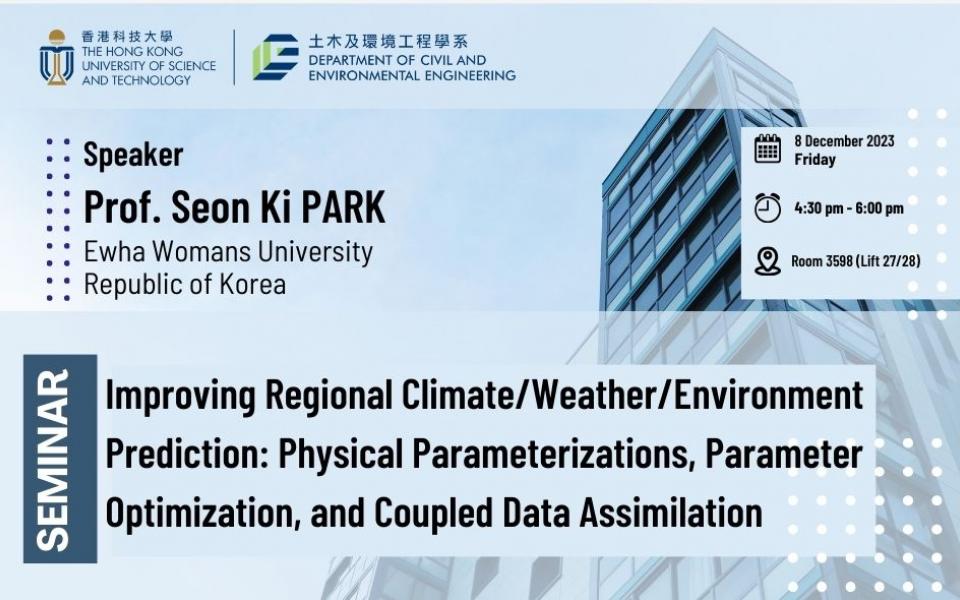Civil Engineering Departmental Seminar - Improving Regional Climate/Weather/Environment Prediction: Physical Parameterizations, Parameter Optimization, and Coupled Data Assimilation
Supporting the below United Nations Sustainable Development Goals:支持以下聯合國可持續發展目標:支持以下联合国可持续发展目标:
Improving Regional Climate/Weather/Environment Prediction: Physical Parameterizations, Parameter Optimization, and Coupled Data Assimilation
Numerical prediction of climate/weather/environment is an important source for adequate policy making in an era of changing climate. It requires a coupled modeling system, such as atmosphere-land surface-chemistry, etc.; its performance can be improved through better estimation of parameters and initial conditions. Numerical climate/weather models provide not only the future state of climate/weather but also the analysis data of model variables at given horizontal/vertical grid resolutions, which are useful especially in data void areas.
Some recent efforts to improve the regional weather/climate/environment prediction will be introduced as an integrated approach, such as developing/improving parameterizations of subgrid-scale phenomena, estimating optimal parameter values (especially for the quantitative precipitation forecasting), seeking an optimized set of parameterization schemes, combining optimizations of parameterization schemes and parameter values sequentially (i.e., superparameterization), and applying a hybrid ensemble-variational data assimilation, by employing the coupled models (e.g., WRF-Noah-MP and WRF-Chem) and satellite data.
Based on these efforts, we have developed an integrated regional climate prediction system ― the Regional Environment/Climate Integrated Prediction System of Ewha Womans University (RECIPE). The RECIPE is based on a coupled modeling system of meteorology (WRF) and land surface (Noah-MP) with some improved features in the land surface processes, including vegetation phenology, stem index, and carbon assimilation and allocation. It is also equipped with the state-of-art techniques, including optimal parameter estimation using an evolutionary algorithm, and advanced data assimilation.
Dr. Seon Ki Park is Professor of Climate and Energy Systems Engineering at the Ewha Womans University (EWU), Seoul, Korea; he established and served as the Founding Directors of two research centers at EWU --- the Severe Storm Research Center (SSRC) and the Center for Climate/Environment Change Prediction Research (CCCPR). His research focuses on storm- and meso-scale meteorology, coupled modeling of land surface-atmosphere-chemistry, and numerical prediction of high-impact weather/climate/environment, including data assimilation and parameter optimization. He obtained a Ph.D. in Meteorology from the U. of Oklahoma (OU) in 1996, then worked as a research scientist at OU, U. of Maryland and NASA/GSFC before he joined EWU in 2001.
He has served the university administration as Director of Environmental Science and Engineering, Associate Dean of Engineering, and Vice President of University Planning and Coordination. He received several awards from EWU such as the Teaching Excellence Award, the Research Excellence Award, and the Research Grant Excellence Award, and from the Korean government such as the Administrator’s Award (Korea Meteorological Administration), the Minister’s Award (Ministry of Environment), and the Service Merit Medal.
He has also served as the President of Atmospheric Sciences Section of the Asia Oceania Geosciences Society (AOGS) in 2012-2014, and will serve as the President of the Korean Meteorological Society in 2024-2025.
